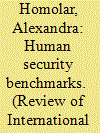| Srl | Item |
| 1 |
ID:
113298


|
|
|
|
|
| Publication |
2012.
|
| Summary/Abstract |
As the concept of human security has become part of the mainstream discourse of international politics it should be no surprise that both realist and critical approaches to international theory have found the agenda wanting. This article seeks to go beyond both the realist and biopolitical critiques by situating all three - political realism, biopolitics and human security - within the history and theory of the modern rise of the social realm from late eighteenth and nineteenth century Europe. Human security is the further expansion of social forms of governance under capitalism, more specifically a form of socialpolitik than realpolitik or biopolitics. Drawing on the work of historical sociologist Robert Castel and political theorist Hannah Arendt, the article develops an alternative framework with which to question the extent to which 'life' has become the subject of global intervention through the human security agenda.
|
|
|
|
|
|
|
|
|
|
|
|
|
|
|
|
| 2 |
ID:
142233


|
|
|
|
|
| Summary/Abstract |
When the United Nations Development Programme formally introduced the concept of human security in 1994, it was widely celebrated as a long-overdue humanist alternative to orthodox models of security. Today, human security is a buzzword for describing the complex challenges that individuals and communities face in achieving safety and wellbeing in an insecure world. This article directs attention away from the emancipatory and empowering qualities commonly ascribed to human security to explore, instead, the specific role of benchmarking within the wider human security agenda. The main focus here is on the ways in which human life has been operationalised, measured, and classified to create indicators that permit judgements about individual security and insecurity. The article argues that although a single global human security benchmark has yet to be established, the main indices used as performance metrics of human insecurity have produced a narrow understanding of what it means to live a ‘secure’ life and have reinforced the state as the main focal point of international security governance.
|
|
|
|
|
|
|
|
|
|
|
|
|
|
|
|